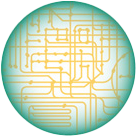The Integrated Biological and Computational Low-Dose Radiation Research area supports research to develop disease risk prediction and, in the longer term, inform radiation protection measures for the public and the workplace. Low-dose radiation research is focused on cellular and molecular responses to doses of radiation that are at or near lower exposure limits
This research takes advantage of recent developments in experimental and artificial intelligence (AI) and machine learning (ML) technologies to understand changes in cellular metabolism due to low-dose radiation exposure. Initial projects will develop a series of highly curated experimental datasets across a range of cell types to assess changes in cell function due to low-dose radiation exposure. These datasets will serve as training data for a burgeoning AI/ML modeling capability for low-dose radiation research. This new approach may provide a better way to identify markers and patterns linked with altered cellular function that may signal an adverse health outcome.
Research goals include
- Developing integrated biological and computational approaches
- Establishing comprehensive datasets to gain new insights on the effects of low-dose radiation exposure on cellular functions
Current DOE Laboratory Project
LUCID: Low-Dose Understanding, Cellular Insights, and Molecular Discoveries
- Principal Investigator (PI): Rick Stevens, Argonne National Laboratory
- Senior/Key Personnel: Tom Brettin (Argonne National Laboratory), Francis Alexander (Argonne National Laboratory), Shantenu Jha (Brookhaven National Laboratory), Byung-Jun Yoon (Brookhaven National Laboratory), Anuj Kapadia (Oak Ridge National Laboratory), Heidi Hanson (Oak Ridge National Laboratory)
Low-dose radiation exposures are common and unavoidable, arising from natural and medical sources, but their relationship to cancer risk remains an open question in radiobiology and public health. Low-dose Understanding, Cellular Insights, and Molecular Discoveries (LUCID) proposes an integrated experimental, computational, and data-driven approach that harnesses the power of AI to create a comprehensive, integrative system capable of significantly automating hypothesis generation, paving the way for more efficient identification and prioritization of research questions. By integrating a diverse array of data and resources and applying natural language processing and advanced AI algorithms, our approach aims to uncover novel insights, suggest potential collaborations, and propose follow-up experiments or analyses—leading to breakthroughs in our understanding of this complex field.
Current University Awards
In 2024, the DOE announced funding for 14 low-dose radiation projects. The projects were selected by competitive peer review. The awarded projects involving multi-institutional teams include diverse and innovative experimental and computational approaches. The model systems to be used in the research range from model human-derived cells/organ systems to mouse models and computational models. The research has the potential to
- Expand understanding of low-dose radiation effects on cellular processes;
- Identify biomarkers of radiation exposure; and
- Refine risk predictions of health effects associated with low-dose radiation from a more mechanistic perspective.
See corresponding Funding Opportunity Announcement.
